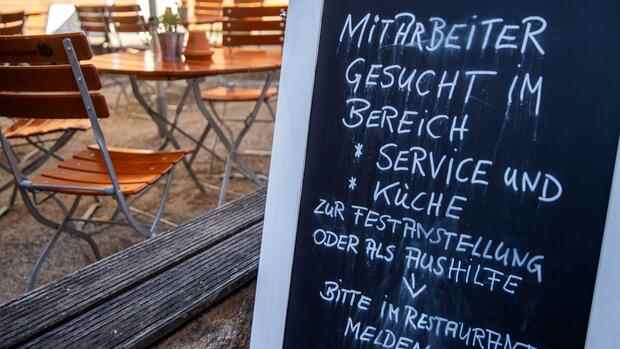With the relaxation of the corona restrictions, the need for staff in the hospitality industry is also increasing.
(Photo: dpa)
Berlin Even if the delivery problems for raw materials and intermediate products have not yet had an impact on the employment policy of industrial companies, the willingness of the German economy to recruit was somewhat dampened in October.
The Ifo employment barometer fell to 103.6 points – after 104.3 points in September. “Nonetheless, the labor market is still on a recovery course,” commented Ifo expert Klaus Wohlrabe on the latest data. The employment barometer is based on the personnel planning of around 9,000 companies and is calculated monthly by the Munich Ifo Institute exclusively for the Handelsblatt.
The sub-index for the manufacturing sector has remained almost constant compared to the previous month. Although companies have registered short-time work because of the supply bottlenecks, large-scale job cuts do not yet seem to be an issue in the industry.
Service providers liked the indicator. So they are becoming a little more cautious in their expansion plans, but the bottom line is that they want to continue to build staff. The hospitality industry and temporary employment agencies are also still looking for new employees. The retail sector is looking for additional staff more intensively than in the previous month, while the construction industry is a little more cautious than in September.
Top jobs of the day
Find the best jobs now and
be notified by email.
In addition to the Ifo barometer, the labor market barometer of the Institute for Employment Research (IAB) has also fallen – for the second time in a row. In October it was still at a very high level at 104.7 points – albeit 1.5 points lower than in the previous month.
The number of newly concluded apprenticeship contracts is higher than the previous year’s figure
“After the furious catch-up race from the summer, the positive labor market development is taking a more moderate course,” explains IAB expert Enzo Weber. The indicator is based on a monthly survey by the Federal Employment Agency (BA) among all local employment agencies.
In terms of employment, the IAB continues to look very positively into the future. Due to the re-entry of people who withdrew from the labor market during the corona crisis, and due to short-term catch-up effects during migration, the number of people in employment should develop positively. Unemployment is still falling, but much more slowly than in the recovery phase on the labor market immediately after the end of the lockdown.
Positive news came from the training market on Tuesday. Although the pandemic has not yet ended, companies in industry and trade, craft and the liberal professions have again concluded more new training contracts this year than in the previous year.
Accordingly, the companies had concluded 435,383 training contracts by the end of September – two percent more than a year earlier, as the associations BDA, DIHK and BFB jointly announced. “The trend on the training market makes me confident,” said employer president Rainer Dulger.
The important message is now: “It is not too late to sign a contract for the training year 2021/2022. Because even after the official start of the apprenticeship year, numerous companies are still looking forward to applicants for their vacant apprenticeship positions. ”For the 14th year in a row, more vacant apprenticeship positions are to be expected than applicants who have not been placed.
With a plus of 9.9 percent, the liberal professions increased the number of new training contracts the most. In the trades the number increased by 2.7 percent, in the companies from industry and trade, which account for almost 60 percent of all new contracts, by 0.4 percent.
More: From a better reputation to a guarantee: what the election programs promise for training and further education
